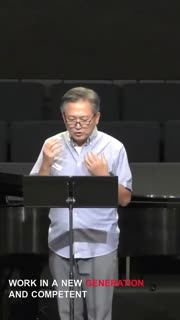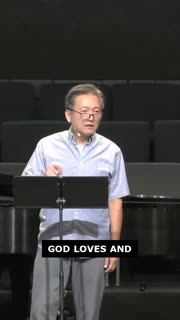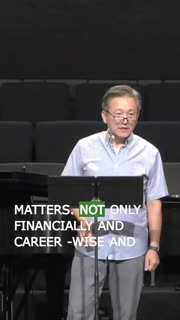Embracing Succession: The Call to Discipleship
Summary
### Summary
Today, we explored the final chapter of Prophet Elijah's life, focusing on his transition to his successor, Elisha. This story is a powerful testament to the importance of succession in ensuring the continuity of God's work. Elijah, who had recently experienced a profound encounter with God at Mount Horeb, was instructed to anoint Elisha as his successor. This act of finding a successor is not just a relief but a significant encouragement, especially for those who feel isolated in their spiritual journey. Elijah's story is particularly relevant today, as many churches face a shortage of young pastors and leaders. This calls for a renewed focus on praying and preparing for future pastoral leadership.
Elisha's calling is a classic example of true discipleship, characterized by being Faithful, Available, and Teachable (F.A.T.). Despite his affluent background, Elisha was found working diligently in the field when Elijah called him. His immediate and sacrificial response to Elijah's call—slaughtering his oxen and burning his plowing equipment—demonstrates his complete commitment to God's call. This act signifies that true discipleship often requires leaving behind our former lives and making ourselves fully available to God.
Elisha's story also highlights the importance of secular work as a preparation for spiritual leadership. Many effective servants of God, including historical figures like Martin Luther and John Calvin, had secular careers before their spiritual vocations. This underscores that our everyday work is not separate from our spiritual lives but is a crucial part of our preparation for God's calling.
Finally, the story emphasizes the necessity of servanthood in discipleship. Elisha served Elijah for many years, learning the humility and dedication required to be a true servant of God. This servanthood is not natural to us but is essential for spiritual growth and leadership. The life of William Borden, who forsook wealth and comfort to follow God's call, serves as a modern example of this sacrificial servanthood.
### Key Takeaways
1. The Importance of Succession in God's Work: Elijah's final act of finding a successor in Elisha underscores that true success in God's work includes preparing the next generation. This ensures the continuity and growth of God's mission, providing encouragement and relief to those who may feel isolated in their spiritual journey. [08:42]
2. True Discipleship Requires Complete Commitment: Elisha's immediate and sacrificial response to Elijah's call—slaughtering his oxen and burning his plowing equipment—demonstrates that true discipleship often requires leaving behind our former lives. This act signifies a total commitment to God's call, showing that availability to God is more important than our past achievements or possessions. [36:16]
3. Secular Work as Preparation for Spiritual Leadership: Many effective servants of God had secular careers before their spiritual vocations. This highlights that our everyday work is not separate from our spiritual lives but is a crucial part of our preparation for God's calling. Secular work teaches us valuable skills like work ethic, teamwork, and leadership, which are essential for spiritual leadership. [29:42]
4. Servanthood is Essential for Spiritual Growth: Elisha's long period of serving Elijah highlights the importance of servanthood in discipleship. This servanthood is not natural to us but is essential for spiritual growth and leadership. True servanthood involves suffering and putting others' needs before our own, which is a reflection of Christ's love and sacrifice. [44:00]
5. Faith in Christ Transforms Lives: The life of William Borden, who forsook wealth and comfort to follow God's call, serves as a modern example of sacrificial servanthood. His life demonstrates that apart from faith in Christ, there is no explanation for such a life. This challenges us to examine our own lives and ensure that our faith in Christ is the driving force behind our actions and decisions. [47:40]
### YouTube Chapters
[0:00] - Welcome
[08:42] - The Importance of Succession
[09:48] - Elijah's Encounter with God
[10:26] - Elijah Meets Elisha
[11:17] - Relevance to Modern Church
[12:10] - Future Pastoral Leadership
[12:52] - Personal Story of Succession
[16:05] - Reading 1 Kings 19:19-21
[16:59] - Characteristics of True Discipleship
[18:10] - Faithful, Available, Teachable (F.A.T.)
[19:12] - Faithfulness in Secular Work
[20:21] - Elisha's Wealth and Faithfulness
[21:41] - God's Unconventional Choices
[23:06] - God's Perspective on Servants
[24:27] - Elijah and Elisha's Social Spectrum
[25:44] - Faithfulness in Little Things
[26:56] - Secular Work as Preparation
[29:42] - Importance of Secular Work
[31:12] - Lessons from Secular Work
[31:53] - No Divide Between Secular and Sacred
[32:34] - Working for the Lord
[33:19] - Examples of Secular Work
[34:09] - Elisha's Call and Response
[34:52] - Sacrificial Availability
[36:16] - Elisha's Celebration of His Call
[37:25] - Sacred Ambition
[38:07] - Faith Over Material Pleasures
[39:18] - God Uses Available People
[40:07] - Making Yourself Available to God
[41:00] - Importance of Sunday Worship
[42:48] - Training in Servanthood
[44:00] - Servanthood and Suffering
[44:54] - Story of William Borden
[47:40] - Faith in Christ Transforms Lives
[48:54] - Song: "I Have Decided to Follow Jesus"
[49:23] - Closing Prayer
Study Guide
### Bible Study Discussion Guide
#### Bible Reading
1 Kings 19:19-21 (NIV)
"So Elijah went from there and found Elisha son of Shaphat. He was plowing with twelve yoke of oxen, and he himself was driving the twelfth pair. Elijah went up to him and threw his cloak around him. Elisha then left his oxen and ran after Elijah. 'Let me kiss my father and mother goodbye,' he said, 'and then I will come with you.' 'Go back,' Elijah replied. 'What have I done to you?' So Elisha left him and went back. He took his yoke of oxen and slaughtered them. He burned the plowing equipment to cook the meat and gave it to the people, and they ate. Then he set out to follow Elijah and became his servant."
#### Observation Questions
1. What was Elisha doing when Elijah found him, and what does this indicate about his background? ([16:05])
2. How did Elisha respond to Elijah's call, and what actions did he take to show his commitment? ([16:59])
3. What does the acronym F.A.T. stand for, and how does it relate to Elisha's calling? ([18:10])
4. How does the story of Elisha's calling illustrate the importance of secular work in preparation for spiritual leadership? ([26:56])
#### Interpretation Questions
1. Why is the act of succession important in God's work, as demonstrated by Elijah and Elisha's story? How does this apply to the modern church? ([08:42])
2. What does Elisha's immediate and sacrificial response to Elijah's call teach us about true discipleship and commitment to God's call? ([36:16])
3. How can secular work serve as preparation for spiritual leadership, according to the sermon? Provide examples mentioned in the sermon. ([29:42])
4. What does the story of William Borden illustrate about faith and sacrificial servanthood? How does this challenge our own faith and actions? ([47:40])
#### Application Questions
1. Reflect on the importance of succession in your own life. Are you preparing someone to continue your work or ministry? How can you start this process? ([08:42])
2. Elisha left his affluent life to follow God's call. Is there something in your life that you need to leave behind to fully commit to God's calling? What steps can you take this week to make yourself more available to God? ([36:16])
3. How does your current secular work prepare you for spiritual leadership? Identify one skill or lesson from your job that you can apply to your spiritual life. ([29:42])
4. Servanthood is essential for spiritual growth. How can you practice servanthood in your daily life? Think of one specific way you can serve someone this week. ([44:00])
5. William Borden's life was driven by his faith in Christ. Examine your own life—what drives your actions and decisions? How can you ensure that your faith in Christ is the primary driving force? ([47:40])
6. Elisha's story shows the importance of being faithful, available, and teachable. Which of these areas do you need to grow in the most? What practical steps can you take to improve in this area? ([18:10])
7. Reflect on your availability to God. Are there distractions or commitments that prevent you from being fully available to Him? How can you minimize these distractions this week? ([40:07])
Devotional
Day 1: Preparing the Next Generation for God's Work
The importance of succession in God's work is highlighted through Elijah's final act of finding a successor in Elisha. This act ensures the continuity and growth of God's mission, providing encouragement and relief to those who may feel isolated in their spiritual journey. In today's context, many churches face a shortage of young pastors and leaders, making it crucial to focus on praying and preparing for future pastoral leadership. By investing in the next generation, we ensure that God's work continues to thrive and expand.
Elijah's story serves as a powerful reminder that true success in God's work includes preparing the next generation. This preparation involves not only identifying potential leaders but also mentoring and equipping them for the challenges they will face. As we invest in the spiritual growth of others, we create a legacy that extends beyond our own lifetime, ensuring that God's mission continues to flourish. [08:42]
1 Kings 19:19-21 (ESV): "So he departed from there and found Elisha the son of Shaphat, who was plowing with twelve yoke of oxen in front of him, and he was with the twelfth. Elijah passed by him and cast his cloak upon him. And he left the oxen and ran after Elijah and said, 'Let me kiss my father and my mother, and then I will follow you.' And he said to him, 'Go back again, for what have I done to you?' And he returned from following him and took the yoke of oxen and sacrificed them and boiled their flesh with the yokes of the oxen and gave it to the people, and they ate. Then he arose and went after Elijah and assisted him."
Reflection: Who in your life can you mentor or encourage in their spiritual journey? How can you begin to invest in their growth and development today?
Day 2: Total Commitment to God's Call
True discipleship requires complete commitment, as demonstrated by Elisha's immediate and sacrificial response to Elijah's call. Elisha's act of slaughtering his oxen and burning his plowing equipment signifies his total commitment to God's call, leaving behind his former life to follow God's plan. This level of commitment challenges us to examine our own lives and consider what we may need to leave behind to fully embrace God's call.
Elisha's story teaches us that true discipleship often involves making significant sacrifices and being fully available to God. This means prioritizing our relationship with God above all else and being willing to let go of our past achievements or possessions. By doing so, we demonstrate our trust in God's plan and our willingness to follow Him wholeheartedly. [36:16]
Luke 9:62 (ESV): "Jesus said to him, 'No one who puts his hand to the plow and looks back is fit for the kingdom of God.'"
Reflection: What is one thing in your life that you need to let go of to fully commit to God's call? How can you take a step towards surrendering it today?
Day 3: Secular Work as Preparation for Spiritual Leadership
Many effective servants of God had secular careers before their spiritual vocations, highlighting that our everyday work is not separate from our spiritual lives. Secular work teaches us valuable skills like work ethic, teamwork, and leadership, which are essential for spiritual leadership. This perspective encourages us to view our daily tasks as opportunities for growth and preparation for God's calling.
Elisha's background as a diligent worker in the field prepared him for his future role as a prophet. Similarly, our secular work experiences can equip us with the skills and character traits needed for spiritual leadership. By embracing our everyday work as part of God's plan, we can develop a strong foundation for future ministry and service. [29:42]
Colossians 3:23-24 (ESV): "Whatever you do, work heartily, as for the Lord and not for men, knowing that from the Lord you will receive the inheritance as your reward. You are serving the Lord Christ."
Reflection: How can you view your current work or daily tasks as preparation for God's calling? What skills or character traits are you developing through your work that can be used for spiritual leadership?
Day 4: The Essential Role of Servanthood in Discipleship
Elisha's long period of serving Elijah highlights the importance of servanthood in discipleship. True servanthood involves humility, dedication, and putting others' needs before our own. This servanthood is essential for spiritual growth and leadership, as it reflects Christ's love and sacrifice. By embracing a servant's heart, we can grow in our faith and become more effective in our ministry.
Servanthood is not natural to us, but it is a crucial aspect of discipleship. Elisha's willingness to serve Elijah for many years demonstrates the humility and dedication required to be a true servant of God. This example challenges us to adopt a servant's mindset, prioritizing the needs of others and seeking opportunities to serve in our daily lives. [44:00]
Mark 10:43-45 (ESV): "But it shall not be so among you. But whoever would be great among you must be your servant, and whoever would be first among you must be slave of all. For even the Son of Man came not to be served but to serve, and to give his life as a ransom for many."
Reflection: In what ways can you practice servanthood in your daily life? How can you prioritize the needs of others and reflect Christ's love through your actions?
Day 5: Faith in Christ Transforms Lives
The life of William Borden, who forsook wealth and comfort to follow God's call, serves as a modern example of sacrificial servanthood. His life demonstrates that apart from faith in Christ, there is no explanation for such a life. This challenges us to examine our own lives and ensure that our faith in Christ is the driving force behind our actions and decisions. By placing our trust in Christ, we can experience true transformation and live a life that reflects His love and sacrifice.
William Borden's story is a powerful reminder of the transformative power of faith in Christ. His willingness to give up material comforts and follow God's call challenges us to consider the depth of our own faith. Are we willing to make sacrifices and trust in God's plan, even when it requires significant changes in our lives? By placing our faith in Christ, we can experience the fullness of life that He offers and become a living testimony of His love and grace. [47:40]
Galatians 2:20 (ESV): "I have been crucified with Christ. It is no longer I who live, but Christ who lives in me. And the life I now live in the flesh I live by faith in the Son of God, who loved me and gave himself for me."
Reflection: How is your faith in Christ transforming your life today? What steps can you take to ensure that your actions and decisions are driven by your faith in Him?
Quotes
1. "Success is not complete without successor. A good successor makes even a moderate success great at the end. On the other hand, success without successor means is always incomplete and even shallow and sad." [08:42] (20 seconds)
2. "Living God's work in a new generation and competent leader is a more than relief of a burden, but a huge encouragement. Just a few days ago, we saw Elijah feeling lonely and utterly depressed. Because he did not know the 7,000 remnant in Israel that God preserved. Now, finally God found Elijah a disciple to co-labor and continue his work." [11:17] (31 seconds)
3. "When you are faithful, available, and teachable to God, everything in your life will be full of His love and joy and fruit and excitement. Let me tell you that. Following God is a never, is, I'm sorry, it's not even sacrificial. It is a great honor." [19:12] (21 seconds)
4. "God loves and uses available people more than able people. Anybody adjust their life to make themselves available to God, God gives them his ability. Hallelujah. Do you wonder where you find the energy and wisdom and you name it, whatever, you know, resources in your life to go next level? You feel like, my life is, something is missing. How can I put my life in a right drive, in the right direction? Make yourself available to God." [39:18] (35 seconds)
5. "Secular work matters. Not only financially and career-wise and vocationally, but spiritually as well. It matters. Why? Secular work teaches us so many important things, like work ethic, teamwork, and collegiality, or practical leadership." [29:42] (20 seconds)
6. "Availability in relationship is a sign and the measure of your love with that person. When you love somebody, you make yourself available to that person, no matter how inconvenient and challenging your circumstance was, would be, might be. Right? You love somebody, we have a story. We have a couple. They met each other online. And they really like each other. What happened? Trying to find a, you know, something in Dallas. Even though they decided to get married, but they couldn't wait. That's the nature of a love." [41:23] (43 seconds)
7. "Elisha accepted the call from Elijah with a small condition. That is, let me kiss my father and mother goodbye. And Elijah's response was a little, you know, puzzling, enigmatic. He said, go back. What have I done to you? Just to make, this simply means, turn back. I have not caused you this. Choice is yours." [35:32] (25 seconds)
8. "Elisha had a sacred ambition. Or holy passion. Whatever you call it in his heart. And the best way to describe his heart is in Hebrews chapter 11 verse 24. By faith, Moses, when he had grown up, refused to be known as a son of a Pharaoh's daughter. In other words, Prince of Egypt. He chose to be mistreated among the people of God rather than enjoy the fleeting pleasures of sin." [38:07] (32 seconds)
9. "Elisha completely made himself available to God. Decisively and immediately leaving everything and everyone behind. In that sense, Elisha was a contrast rich young ruler in the gospel story whom Jesus invited him to sell everything, give to the poor and follow him. And what did the, you know, rich young ruler did? He just went away with a sad face. Today, Elijah did everything the rich young ruler didn't." [37:25] (33 seconds)
10. "God chooses Elijah the loner to oppose the arrogant power and chooses the well-connected Elisha to guide Israel's king through the complications. And Elijah chose Elijah to withhold his will to be able to lead the way to the kingdom of Israel." [25:44] (29 seconds)










